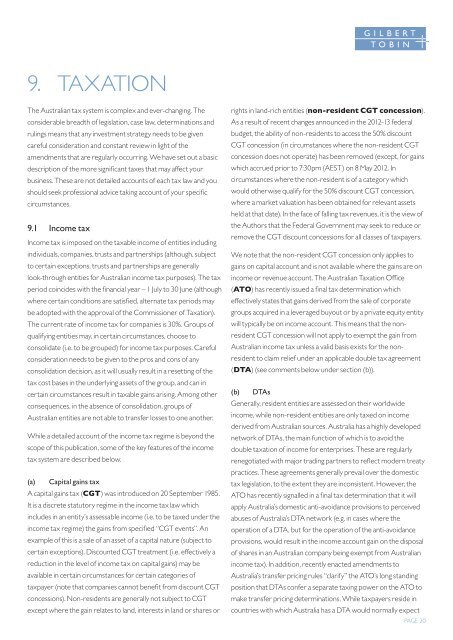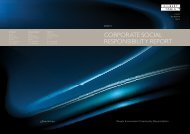Gilbert + tobin - Gilbert and Tobin
Gilbert + tobin - Gilbert and Tobin
Gilbert + tobin - Gilbert and Tobin
Create successful ePaper yourself
Turn your PDF publications into a flip-book with our unique Google optimized e-Paper software.
9. Taxation<br />
The Australian tax system is complex <strong>and</strong> ever-changing. The<br />
considerable breadth of legislation, case law, determinations <strong>and</strong><br />
rulings means that any investment strategy needs to be given<br />
careful consideration <strong>and</strong> constant review in light of the<br />
amendments that are regularly occurring. We have set out a basic<br />
description of the more significant taxes that may affect your<br />
business. These are not detailed accounts of each tax law <strong>and</strong> you<br />
should seek professional advice taking account of your specific<br />
circumstances.<br />
9.1 Income tax<br />
Income tax is imposed on the taxable income of entities including<br />
individuals, companies, trusts <strong>and</strong> partnerships (although, subject<br />
to certain exceptions, trusts <strong>and</strong> partnerships are generally<br />
look-through entities for Australian income tax purposes). The tax<br />
period coincides with the financial year – 1 July to 30 June (although<br />
where certain conditions are satisfied, alternate tax periods may<br />
be adopted with the approval of the Commissioner of Taxation).<br />
The current rate of income tax for companies is 30%. Groups of<br />
qualifying entities may, in certain circumstances, choose to<br />
consolidate (i.e. to be grouped) for income tax purposes. Careful<br />
consideration needs to be given to the pros <strong>and</strong> cons of any<br />
consolidation decision, as it will usually result in a resetting of the<br />
tax cost bases in the underlying assets of the group, <strong>and</strong> can in<br />
certain circumstances result in taxable gains arising. Among other<br />
consequences, in the absence of consolidation, groups of<br />
Australian entities are not able to transfer losses to one another.<br />
While a detailed account of the income tax regime is beyond the<br />
scope of this publication, some of the key features of the income<br />
tax system are described below.<br />
(a) Capital gains tax<br />
A capital gains tax (CGT) was introduced on 20 September 1985.<br />
It is a discrete statutory regime in the income tax law which<br />
includes in an entity’s assessable income (i.e. to be taxed under the<br />
income tax regime) the gains from specified “CGT events”. An<br />
example of this is a sale of an asset of a capital nature (subject to<br />
certain exceptions). Discounted CGT treatment (i.e. effectively a<br />
reduction in the level of income tax on capital gains) may be<br />
available in certain circumstances for certain categories of<br />
taxpayer (note that companies cannot benefit from discount CGT<br />
concessions). Non-residents are generally not subject to CGT<br />
except where the gain relates to l<strong>and</strong>, interests in l<strong>and</strong> or shares or<br />
rights in l<strong>and</strong>-rich entities (non-resident CGT concession).<br />
As a result of recent changes announced in the 2012-13 federal<br />
budget, the ability of non-residents to access the 50% discount<br />
CGT concession (in circumstances where the non-resident CGT<br />
concession does not operate) has been removed (except, for gains<br />
which accrued prior to 7:30pm (AEST) on 8 May 2012. In<br />
circumstances where the non-resident is of a category which<br />
would otherwise qualify for the 50% discount CGT concession,<br />
where a market valuation has been obtained for relevant assets<br />
held at that date). In the face of falling tax revenues, it is the view of<br />
the Authors that the Federal Government may seek to reduce or<br />
remove the CGT discount concessions for all classes of taxpayers.<br />
We note that the non-resident CGT concession only applies to<br />
gains on capital account <strong>and</strong> is not available where the gains are on<br />
income or revenue account. The Australian Taxation Office<br />
(ATO) has recently issued a final tax determination which<br />
effectively states that gains derived from the sale of corporate<br />
groups acquired in a leveraged buyout or by a private equity entity<br />
will typically be on income account. This means that the nonresident<br />
CGT concession will not apply to exempt the gain from<br />
Australian income tax unless a valid basis exists for the nonresident<br />
to claim relief under an applicable double tax agreement<br />
(DTA) (see comments below under section (b)).<br />
(b) DTAs<br />
Generally, resident entities are assessed on their worldwide<br />
income, while non-resident entities are only taxed on income<br />
derived from Australian sources. Australia has a highly developed<br />
network of DTAs, the main function of which is to avoid the<br />
double taxation of income for enterprises. These are regularly<br />
renegotiated with major trading partners to reflect modern treaty<br />
practices. These agreements generally prevail over the domestic<br />
tax legislation, to the extent they are inconsistent. However, the<br />
ATO has recently signalled in a final tax determination that it will<br />
apply Australia’s domestic anti-avoidance provisions to perceived<br />
abuses of Australia’s DTA network (e.g. in cases where the<br />
operation of a DTA, but for the operation of the anti-avoidance<br />
provisions, would result in the income account gain on the disposal<br />
of shares in an Australian company being exempt from Australian<br />
income tax). In addition, recently enacted amendments to<br />
Australia’s transfer pricing rules “clarify” the ATO’s long st<strong>and</strong>ing<br />
position that DTAs confer a separate taxing power on the ATO to<br />
make transfer pricing determinations. While taxpayers reside in<br />
countries with which Australia has a DTA would normally expect<br />
PAGE 20







